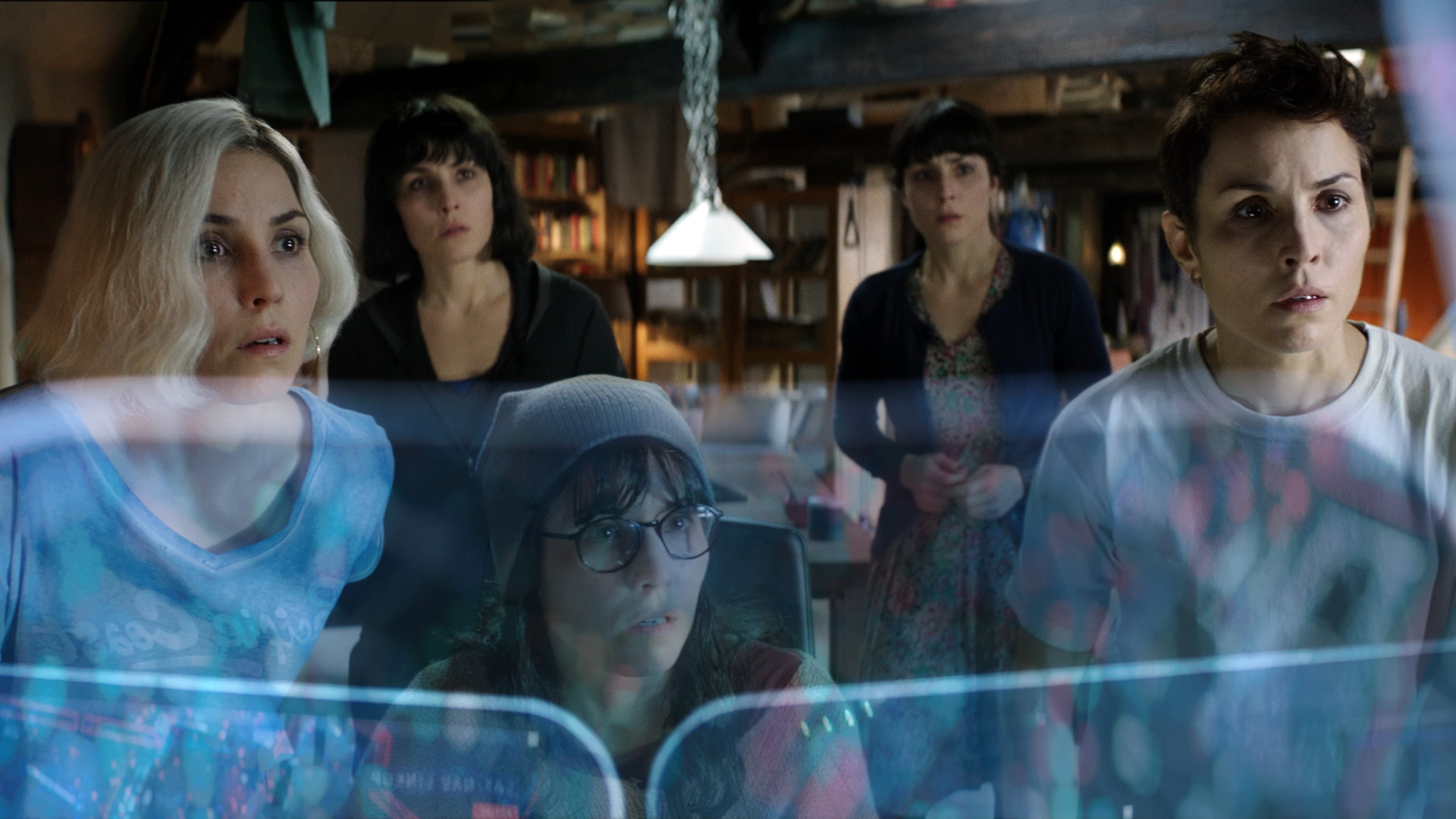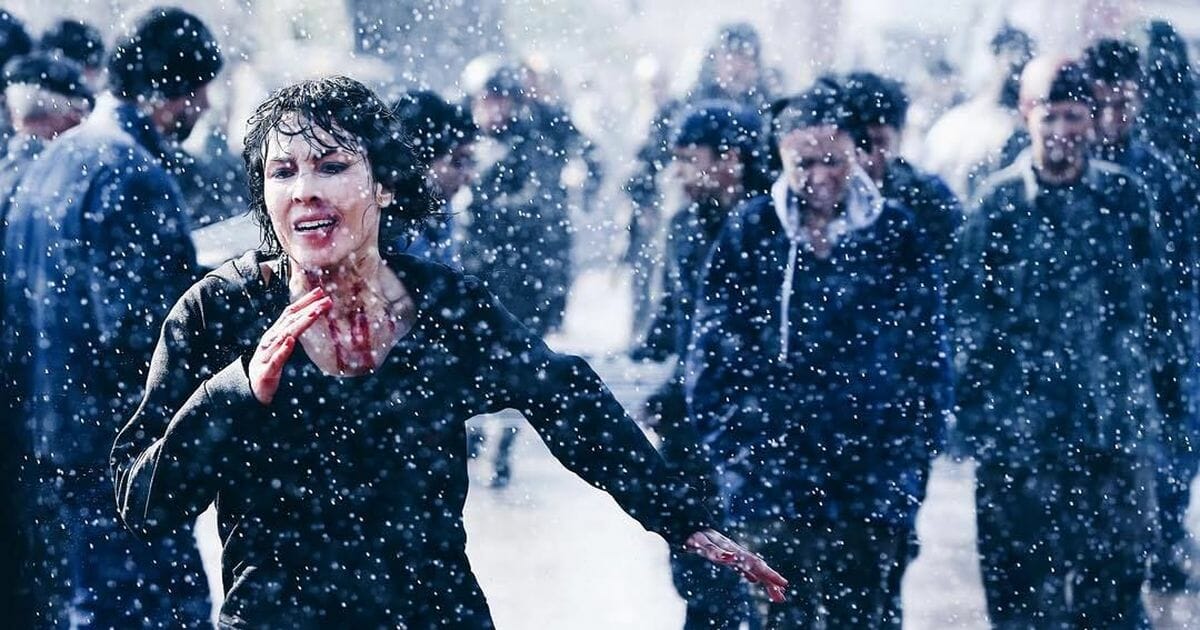In the 2017 dystopian thriller What Happened to Monday, events are set in the not-so-distant future where the human population has exceeded the available food supply (Overpopulation). Noomi Rapace portrays seven identical sisters, each with unique behavioral tendencies and personalities. The role is almost similar to that of Tatiana Maslany in the Orphan Black series in which she portrays Sarah Manning and her clones.
Main Story
What Happened to Monday tells the story of the Settman septuplets in a world where the government enforces the One Child Policy that requires every family to have only one child. Their mother died in labor, so they have been—since birth—taken under the care of their grandfather, Terrence Settman (portrayed by Willem Dafoe). The sisters assume the same identity as Karen Settman, but each is named after a day of the week (Sunday to Saturday) to keep things tidy. Only one sister should come out of the house to go about Karen’s business on the day that corresponds to her name.

The policy dictates that if a family has two or more children, the government allows the family to pick one child to keep and give away all the others to be put into cryogenic sleep indefinitely. Overseeing the implementation of the new policy is the Child Allocation Bureau (CAB) with guarded checkpoints scattered throughout the nation to maintain order.
On a day-to-day basis, the sisters share detailed information about what they do, the people they meet, the things they say, and what they see to keep each other updated on the latest development in life. Rapace showcases commendable performance as seven unique individuals forced to maintain shared memories in public and at the same time develop distinctive mannerisms at home.
Rapace’s performance is good fun to watch. And it is such bewilderment considering how the script only gives a short and simple, perhaps grossly inadequate description of the septuplets. Monday is the first-born golden child, Tuesday a loose cannon, Wednesday the athletic sister, Thursday a rebel, Friday a computer wizard, Saturday a party animal, and Sunday the church-going caregiver. Apart from the hairstyles and costumes, Rapace has to work everything out using gestures and expressions. It is not an easy task for even the most experienced actor, but she delivers.
All the exciting bits about the film start when Monday fails to return home, which turns the film into a full-blown chasing action flick with some graphically intense violence. It delivers a nice blend of fast-paced action sequences and a blanket of mystery against a backdrop of a bleak dystopian society. As Monday disappears, the family sends Tuesday as a replacement. Without the latest update from Monday, the tension quickly builds up with Tuesday’s every move and encounter with other people. And then Tuesday doesn’t return home.

The sisters scramble around town to look for their missing siblings, only to figure out that Monday has involved herself in an evil plan with Nicolette Cayman, head of the CAB. Monday reveals the decades-long secret about the family and in return, the bureau promises that she can live free, without having to hide her personality from everyone, especially the government.
During the investigative effort, the sisters unravel a cruel government conspiracy to maintain power. When they finally manage to break into the CAB headquarters, it is revealed that the cryogenic sleep chambers are nothing but lies. The cryogenic tubes are, in fact, incinerators. Thursday obtains a video recording of a little girl being incinerated. A broadcast of the video during a mass gathering event becomes the beginning of the end of CAB. Cayman is sentenced to death as CAB is dissolved.
Suppressed Individuality
What Happened to Monday is not the first film to use overpopulation as a central narrative. We have seen a similar idea in other movies from bygone years like Soylent Green (1973), Logan’s Run (1976), Wall-E (2008), Mother: Caring for 7 Billion (2011), Dredd (2012), and Children of Men (2006) to name a few. All of them offer glimpses of an overpopulated world, which is a real plausibility. Every movie depicts a solution, most likely a drastic measure, to prevent further resource scarcity.
One Child Policy is the counteraction of choice in What Happened to Monday. Using the backdrop of overpopulation, the film delivers a subtheme of suppressed individuality in Rapace’s seven characters as a mechanism for survival. The primary need to stay alive triumphs over the innate desire for private life and to develop a personal identity. Monday’s decision to accept a bribe and reveal her own family secret depicts the inevitable desperation for freedom of expression–for a way of life without the overbearing shadow of Karen.

What Monday and her sisters go through psychologically in the film makes for an almost perfect visualization of life in a dystopian society under a totalitarian government. The incinerators, disguised as cryogenic tubes, become the instruments to suppress citizens’ rights to live, feel safe, and be free. Although the one-child policy does make sense amidst a surge in population growth, the authorities use the proposed solution as a scheme of oppression.
The mystery surrounding the disappearance of Monday is a tinderbox for the sisters in defeating the corrupt system and reclaiming their freedom. In the process, they overcome the oppressive CAB that seeks only to stay in power at all costs. All the chase sequences, stylish gunfights, and the occasional gore as well as sex scenes should keep most viewers engaged in the storyline. More importantly, Rapace’s portrayal of the seven sisters is so praise-worthy that the audience truly cares about what happens not only to Monday but all of them. That said, the film barely has anything that’s fresh, let alone groundbreaking. What Happened to Monday is a pretty standard conspiratorial thriller; it is not the greatest, but very far from the worst.
What do you think? Let us know. We’d love to hear from you.
Other things you might want to know about:
Will overpopulation happen?
According to the UN, the human population worldwide already reached 8 billion by November 2022, a massive increase from 2.5 billion in 1950. It is estimated the human population will increase to around 10.4 billion by the mid-2080s. More than half of the population growth in the next 30 years is expected to occur in Africa.
For more information about the global population, please visit the UN – Global Issues: Population.
Is population decline a possibility?
An analysis of the UN projections by Our World in Data indicates a strong likelihood of population growth decline in the late 21st century. The actual population is growing, but the growth rate is declining. In fact, it is expected the population will stop growing at all after 2100.
Visit Our World in Data to get more insights.
Is the “One Child Policy” depicted in What Happened to Monday based on a true event?
The only country known to have implemented an actual nationwide one-child policy was China. It started in 1980 and came to an end in 2016. China enforced the policy to curtail population growth, which at that time was viewed as “too rapid” by the authority.
Visit Britannica: One-Child Policy for more.
For more What Happened To Monday, click here!
Check out other articles by month:







